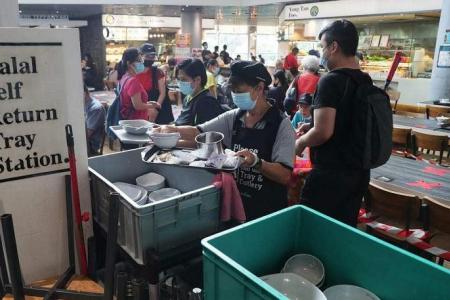Most S’poreans return trays, because it’s socially responsible, not because of fines: Survey
Singaporeans are taking more personal responsibility for keeping food spaces clean, says a new survey, with 95 per cent of all respondents returning their trays and crockery every time they ate at a coffee shop or hawker centre in 2022.
This is a 46 per cent increase from the number in 2021, following a fine that was introduced at the beginning of 2022 for those who did not clear their trays.
While this behavioural change can be partly explained by the fine, the survey also found deeper shifts in attitudes toward personal responsibility underfoot, with 78.4 per cent of respondents claiming that they cleared their tables because it was the socially responsible thing to do, rather than because they were trying to avoid being fined.
Additionally, 84 per cent of respondents said they believed that the individual diner is primarily responsible for keeping tables clean, rather than cleaning staff or outlet operators, up from 58 per cent of respondents in 2021.
These were among results highlighted in the fifth annual Public Cleanliness Satisfaction Survey 2022 conducted by The Singapore Management University (SMU), which surveyed 2,020 Singapore residents on their perceptions of cleanliness in the nation from July to October 2022 amidst the Covid 19 pandemic.
Respondents were surveyed on how clean they perceived Singapore to be across public domains such as parks and green spaces, MRT or LRT stations, food outlets in malls or hawker centres, toilets, and post events like the National Day Parade.
The respondents were also surveyed on the reasons behind their personal evaluations, and who they thought should be held responsible for these evaluations, among other things.
Professor Paulin Tay Straughan, sociology professor at SMU and co-lead of the study, said the findings of this year’s study regarding food spaces were exciting from a sociological perspective, because they pointed towards norms of a greater personal responsibility for keeping coffee shops and hawker centres clean.
But when it came to personal responsibility for other public spaces, such as outdoor parks, shopping malls or MRT stations, the picture was less rosy. Some 77 per cent of Singaporeans thought it was the government’s responsibility to keep Singapore clean in 2022, an increase from 73 per cent in 2021, an indication that the personal responsibility they felt in keeping food outlets clean did not translate elsewhere.
Instead, respondents felt that more money should be spent on hiring more cleaners in order to keep public spaces clean.
For instance, when presented with a scenario of overflowing rubbish bins, 59 per cent of respondents thought cleaners were not doing their job effectively, and 81 per cent felt that more money should be spent on cleaning services. In 2021, 59 per cent thought cleaners were not doing their job effectively, and 60 per cent felt that more money should be spent on cleaning services.
Also, 90 per cent of respondents also thought that Singapore was clean only because of the efficiency of its cleaning services, suggesting that individual responsibility was not highly rated as a reason for cleanliness, as it may be in nations like Japan.
An attitude of thinking that cleaners are mainly responsible for keeping public spaces clean will pose an increasing problem as the Republic grapples with a shortage of cleaning staff and the cost of cleaning services goes up over time, said Prof Straughan.
In 2022, ST found that some local cleaning firms were so short of staff once the border with Malaysia reopened that they had to turn down new jobs or give up existing contracts.
Basic wages for cleaners in Singapore will also increase progressively over six years from 2023 under the Progressive Wage Model.
Prof Straughan said: “Now is the time for us to think about the shared responsibilities we have over public spaces and what we can do to keep costs down and alleviate our over-reliance on cleaners.”
She added: “It’ll certainly be hard for us to empty trash and so perhaps there are areas which we should save for the limited amount of help that we can get, but it is doable for us to wipe down table tops after using them.”
Acknowledging that personal responsibility for community spaces is a spectrum, Prof Straughan said the study showed there can now be a public conversation on how far people can help to keep clean places that they use.
While more people were comfortable clearing their own trays, the survey showed satisfaction with the cleanliness of food outlets fell from 85 per cent in 2021 to 83 per cent in 2022.
Prof Straughan said though people accepted they had personal responsibility, they also expected operators, as well as the government, to be responsibility for keeping facilities clean and conducive.
For instance, rubbish bins should still be cleared in a timely fashion, and there should be a number for citizens to call if they see that they are not, to have their concerns addressed. Even more radical frameworks of responsibility could be created, with citizens of an area given ownership over the cleanliness of their neighbourhoods, she suggested.
Ultimately, it is the partnership between the patrons, operators and the government that will keep Singapore clean and well taken care of, Prof Straughan said.
Almost all survey respondents agreed, with 99 per cent of respondents saying residents must work together with cleaners to keep the neighbourhood clean.
Besides the new insights on personal responsibility, the public cleanliness survey also indicated overall satisfaction with public cleanliness in Singapore, with 92 per cent of Singaporeans satisfied with the cleanliness of public spaces that they had recently visited, similar to results from survey last year.
However, some perennial problem areas may have become even less acceptable, with only 53 per cent of respondents indicating that they were satisfied with the cleanliness of public toilets in coffee shops in 2022, down from 61 per cent in 2021.
The satisfaction with cleanliness in public toilets in hawker centres also decreased from 68 per cent in 2021 to 63 per cent in 2022.
The study also found Singaporeans to be more disciplined about personal hygiene as well, with 69 per cent of respondents washing their hands when there is a need, for instance, after using the bathroom or before they ate.
This is compared with 56 per cent in 2021. The top reason cited for not washing hands was the use of alternatives, like hand sanitisers, which became popular during the pandemic.
Get The New Paper on your phone with the free TNP app. Download from the Apple App Store or Google Play Store now



